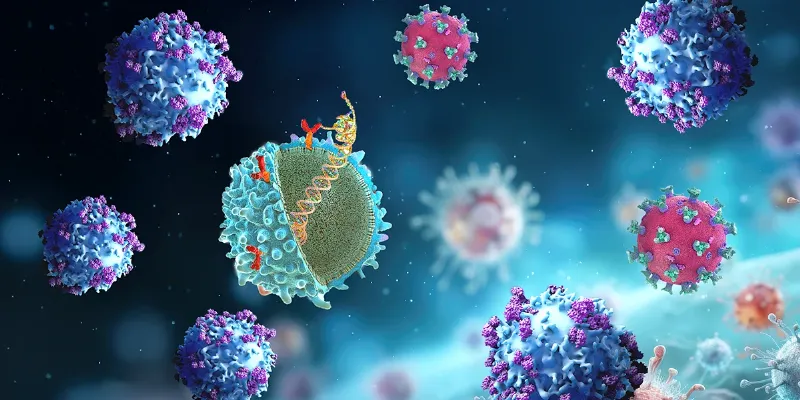Promising Targeted Immunotherapy Improves Survival in HPV16+ Cancers


ONCOLife |
24 July 2025
The growing incidence of HPV16-positive cancers represents a significant challenge in oncology despite recent therapeutic advances. In this exclusive interview, Frank Bedu-Addo, President and CEO of PDS Biotech, introduces Versamune® HPV—an innovative, targeted immunotherapy designed to harness T cells against HPV16-driven tumors. Bedu-Addo shares updated data from the VERSATILE-002 Phase 2 trial, which achieved a median overall survival of 30 months in recurrent and metastatic (R/M) HPV16-positive head and neck cancer.
Frank Bedu-Addo also discusses the impressive tolerability of Versamune® HPV, its Fast Track designation, and upcoming clinical milestones that could significantly advance treatments for head and neck, as well as cervical, cancers.
Click the picture to view the PDF version: Pg 14-17.
The updated results from the VERSATILE Phase 2 trial show improvements in overall survival for patients treated with Versamune® HPV. Could you analyze and share your views about these results?
Bedu-Addo: The VERSATILE-002 trial demonstrated promising survival outcomes in patients with R/M HPV16-positive head and neck cancer. This single-arm study of Versamune HPV combined with pembrolizumab was conducted in over 30 clinics across the United States and Europe, which increases our confidence in the results.
Over the past year, we’ve observed continued tumor shrinkage and disease stabilization in several patients, culminating in a median overall survival of 30 months. To date, this is the longest published overall survival in this disease state. Importantly for patients, Versamune HPV is administered via a simple subcutaneous injection and does not appear to compound toxicity when administered with standard of care such as pembrolizumab or chemoradiotherapy.
Versamune HPV is described as a targeted immunotherapy. Can you explain the mechanism of action of the Versamune platform and how
it specifically activates the immune system against HPV16- positive tumor cells?
Bedu-Addo: I believe that Versamune HPV has the potential to become the first approved HPV-targeted immunotherapy for cancer. Unlike traditional chemotherapy, which can initially shrink tumors but may offer only short-lived benefits, Versamune HPV recruits and trains the immune system to mount a powerful and sustained attack against HPV16-positive cancers, offering exciting promise for improved patient outcomes by training and activating T cells to recognize HPV16, the cancer-causing agent.
Specifically, Versamune HPV consists of Versamune nanoparticles and a proprietary mixture of HPV16 E6 and E7 protein fragments. Upon injection, Versamune HPV activates local cells of the immune system to internalize and deliver it into the lymph nodes.
There, the HPV16 fragments are presented via the MHC Class I and Class II pathways, thus recruiting and training CD8 and CD4 T cells to recognize HPV16 as foreign. This mechanism promotes a robust, multifunctional T-cell response that targets and destroys tumor cells harboring HPV16.
The VERSATILE trial reported an objective response rate of 36%, a disease control rate of 77%. Could you elaborate on how Versamune HPV enhances the efficacy of pembrolizumab, leading to such significant tumor responses?
Bedu-Addo: The fact that over 20% of our patients—one in every five—are experiencing complete or nearly complete responses of greater than 90% tumor shrinkage is a very promising outcome. Pembrolizumab blocks PD-1, which is a mechanism that many tumors use to hide from the body’s immune system.
Versamune HPV complements this approach by recruiting and training T cells to target and attack the tumor. This complementary approach leads to significant antitumor responses and serves as strong proof of concept for applying our technology to other tumor-associated proteins in cancers such as breast, prostate, lung, and ovarian cancers.
HPV-associated cancers often have an immunosuppressive tumor microenvironment. How does the Versamune platform overcome this challenge to effectively activate T-cell responses against tumor cells?
Bedu-Addo: Recurrent/metastatic HPV-positive tumors are highly immunosuppressive and difficult to treat. Versamune nanoparticles upregulate the body’s ability to activate T cells to attack the targeted cancer. Additionally, Versamune induces a robust influx of multifunctional killer T cells that transform the tumor microenvironment by boosting effector T cells and reducing immunosuppressive regulatory T cells.
It also promotes the production of inflammatory cytokines like IL-2, IL-12, and TNF, converting the environment from immunosuppressive to immunogenic, which enhances T cell-mediated tumor killing. It therefore has strong potential to significantly advance cancer treatment.
Versamune HPV has received Fast Track designation from FDA. What accelerated pathways does this open up, and how can it speed up bringing this therapy to patients?
Bedu-Addo: I’m excited about our Fast Track designation because it will speed up the review of Versamune HPV by the FDA. One key benefit is the rolling review process, where we can submit completed sections of our Biologics License Application as they’re finished. Combined with our trial’s interim data readouts powered for overall survival, this process has the potential to shorten time to approval pending trial results.
Can you share any early results and explain if Versamune HPV could be used for other HPV-related cancers?
Bedu-Addo: Versamune HPV has been studied in high-risk patients with locally advanced cervical cancer, who typically have poor responses to stan-dard chemoradiotherapy. Over 50% of cervical cancer patients are HPV16-positive. Sixty-six patients with locally advanced cervical cancer were enrolled at MD Anderson Cancer Center, with 49 receiving standard of care chemoradiotherapy (CRT) and 17 participating in the IMMUNOCERV trial.
These 17 patients received Versamune HPV + CRT. The 36-month survival rate for the IMMUNOCERV group was 100% in patients who received all 5 Versamune HPV doses, and 84.4% in patients who received at least 2 doses. The circulating tumor DNA (ctDNA) results were compared to those from the standard of care CRT cohort. This analysis demonstrated greater and earlier clearance of tumors in the IMMUNOCERV group. In HPV16-positive patients, 100% ctDNA clearance was reported at 3-4 months with Versamune HPV, and ctDNA clearance was predictive of recurrence-free survival.
Overall, the data were extremely encouraging and provided additional evidence for the potential of Versamune HPV. A recently published National Cancer Institute-led study (JAMA Oncology, February 2025) in all types of first-line recurrent/metastatic HPV16-positive cancers showed promising median overall survival exceeding 42 months and an objective response rate of 75%. All 3 independently run Phase 2 trials in about 150 patients show consistently promising clinical responses and patient survival, suggesting Versamune HPV’s potential in all types of HPV-positive cancers.
Looking ahead, what are the key milestones we can expect from PDS Biotech’s immunotherapy pipeline?
Bedu-Addo: This year is exciting one for PDS Biotech. In March, we initiated our VERSATILE-003 Phase 3 trial of Versamune HPV plus pembrolizumab in recurrent/metastatic HPV16-positive head and neck cancers. At the 2025 American Society of Clinical Oncology Annual Meeting, we will provide a data update on the VERSATILE-002 trial, and the Mayo Clinic will present data from their study of Versamune HPV in neoadjuvant treatment of
early-stage oral cancer. In 2026, we anticipate exciting data from at least two NCI-led Phase 2 trials with PDS01ADC, our tumor-targeting IL-12 ADC. Overall, PDS Biotech is focused on transforming how the immune system targets and fights cancer.











Comments
No Comments Yet!